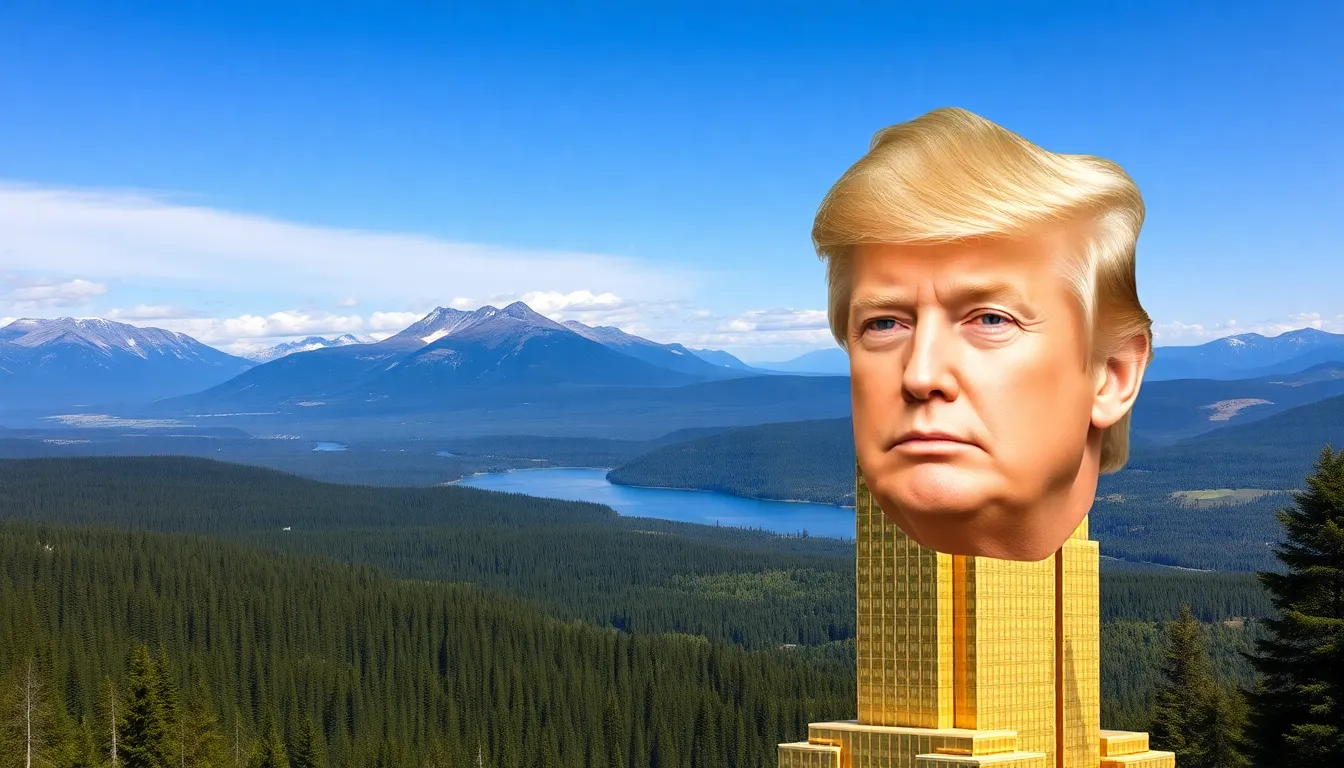In the realm of political discourse, few figures spark as much debate as Donald Trump. His bold statements and unconventional ideas often leave people questioning the boundaries of his ambitions. One of the more outlandish rumors that has circulated is whether Trump harbors aspirations to buy Canada.
This notion, while seemingly absurd, reflects the larger-than-life persona that Trump has cultivated over the years. As discussions about national borders and economic partnerships evolve, it’s essential to explore the implications of such a claim. Does this idea stem from genuine interest in expansion, or is it merely a sensational headline? Delving into this topic reveals insights into Trump’s mindset and the complexities of international relations.
Table of Contents
ToggleOverview of the Situation
Rumors about Donald Trump’s alleged desire to buy Canada emerged amidst his history of provocative statements. Speculation about this notion stems from his previous comments regarding the need for stronger governance and improved economic agreements with neighboring countries. Statements with bold undertones often attract media attention and public discourse.
Analyzing the context reveals Trump’s strategic focus on international relations. He emphasizes advantageous trade deals and economic partnerships, which aligns with the concept of expanding U.S. influence. Critics argue such discussions reflect a misunderstanding of geopolitical dynamics, as countries cannot be purchased. Trump’s supporters, however, view the conversation as an unorthodox approach to strengthening ties between the U.S. and Canada.
Public reactions vary widely. Some dismiss the idea as a publicity stunt, while others find merit in Trump’s unconventional strategies. Assessing public sentiment includes exploring how Trump’s administration previously managed foreign affairs. Previous negotiations centered on trade agreements rather than territorial acquisition, showcasing his pattern of prioritizing economic interests.
Overall, the possibility of Trump wanting to buy Canada seems far-fetched. It signifies a sensational headline rather than a legitimate political ambition, reflecting the complexities inherent in contemporary political dialogue.
Historical Context

The concept of Donald Trump wanting to purchase Canada prompts an examination of historical precedents and the political climate surrounding such a notion. Understanding Trump’s background offers insight into this unlikely claim.
Previous Real Estate Ventures
Trump’s extensive real estate experience spans various countries and regions, including high-profile projects in the United States, the Caribbean, and Asia. Throughout his career, Trump has pursued acquisitions with the objective of maximizing property values and expanding his brand. His interests have predominantly focused on commercial and residential properties, luxury hotels, and golf courses. While Trump’s real estate ventures showcase his ambition, they do not equate to aspirations for acquiring entire nations.
Political Landscape
The political landscape at the time of Trump’s commentary significantly influences public perception. Trump’s presidency (2016-2020) highlighted a departure from traditional diplomatic practices. His administration emphasized “America First” policies, often straining relations with neighboring countries, including Canada. Speculative remarks on ownership or acquisition, even humorously, serve as a lens through which to evaluate America’s foreign policy direction. Critics often interpret such claims as exaggerations, while supporters may view them as emblematic of Trump’s unorthodox approach to leadership and governance. The response to these ideas reflects broader discussions on nationalism and international alliances in contemporary politics.
Key Statements and Claims
The discussion around Donald Trump’s potential desire to buy Canada centers on several public comments he made and the resulting reactions from officials in Canada. These elements together shape the understanding of this controversial topic.
Trump’s Public Comments
Trump has made several provocative remarks that hint at his views on international relationships and territorial governance. For instance, he referenced the U.S.-Canada trade deal as problematic and suggested integrating Canadian resources into U.S. economic frameworks. His comments often emphasize the need for stronger negotiations and suggest he views foreign relationships through a transactional lens. This rhetoric has led some to speculate about his intentions regarding Canada, despite the lack of concrete proposals.
Reactions from Canadian Officials
Canadian officials have largely dismissed Trump’s comments as outlandish. Prime Minister Justin Trudeau, along with other political leaders, characterized the notion of the U.S. purchasing Canada as unrealistic and strategically unfeasible. Officials stress the importance of maintaining strong diplomatic relations and emphasize that Canada is a sovereign nation. Public sentiment reflects a mix of incredulity and concern, with many Canadians expressing a desire for respectful and collaborative partnerships rather than ownership implications.
Analysis of Motivations
Examining Trump’s motivations for these rumored aspirations requires a closer look at his business interests and the strategic significance of Canada.
Business Interests
Trump’s history in real estate demonstrates a focus on high-value acquisitions, often prioritizing locations that promise substantial returns on investment. His ventures typically target markets where he perceives potential for growth. Trump’s remarks about Canada may stem from a desire to leverage Canadian assets, including energy resources and agricultural land, aligning with his interests in expanding market share. Critics argue that blending business strategies with national governance leads to misconceptions about foreign policy, claiming that Trump’s commercial lens may warp the understanding of international relations.
Strategic Significance
Canada occupies a pivotal role in North American geopolitics, sharing the longest international border with the U.S. and serving as a major trading partner. Strategic interests hinge on military cooperation, energy security, and resource management. Trump’s comments often lead to speculation about leveraging Canada’s resources for U.S. economic gain, reflecting a worldview that prioritizes national prosperity. The “America First” approach reinforced by Trump complicates the relationship with Canada, fueling discussions on sovereignty and autonomy. U.S. engagement in Canada influences both countries’ economic landscapes, prompting Canadian leaders to reaffirm the importance of collaborative partnerships over ownership scenarios.
Public Perception and Media Coverage
Public perception regarding Trump’s alleged desire to buy Canada encompasses a wide array of reactions. Some segments view the idea as a mere joke or publicity stunt, while others analyze it through a political lens. Media coverage varies, often oscillating between satire and serious commentary. Many media outlets highlight the dissonance between Trump’s often outrageous rhetoric and established diplomatic protocols.
Critics argue that media amplification of the buying narrative obscures significant geopolitical discussions. Many analysts note these discussions reflect a misunderstanding of international relations. Supporters highlight that such controversial statements serve as bold invitations for dialogue. They assert Trump’s unconventional communication method often generates necessary discussions about U.S.-Canada relations.
Key statements made by Trump receive extensive attention in various media forms. Analysts scrutinize remarks concerning the U.S.-Canada trade deal, interpreting them as implications of potential resource integration. Commentators frequently emphasize that this speculation arises despite the lack of concrete proposals, leading to further confusion in public discourse.
Canadian officials, including Prime Minister Justin Trudeau, consistently counter the narrative by reaffirming their commitment to strong diplomatic ties. Coverage in Canadian media often focuses on public sentiment characterized by incredulity and concern. Many Canadians advocate for constructive partnerships rather than discussions about ownership.
Trump’s previous behavior and statements shape the media’s portrayal of these rumors. Many journalists assess his real estate history, suggesting his approach to acquisitions influences perceptions of his intentions regarding Canada. The strategic significance of Canada in Trump’s worldview becomes a focal point in discussions about international agreements.
Ultimately, discussions surrounding Trump’s alleged ambition to buy Canada foster broader conversations on nationalism and international relations. The interplay of public perception and media coverage continues to inform ongoing debates about future U.S.-Canada interactions.
The notion of Trump wanting to buy Canada appears more like a sensational headline than a serious political ambition. It highlights the complexities of modern political discourse and the ongoing debates about nationalism and international relations. While Trump’s provocative statements may spark curiosity and speculation, they often reflect a misunderstanding of geopolitical dynamics.
Canadian officials and the public have largely dismissed these ideas, emphasizing the importance of maintaining strong and respectful diplomatic ties. Ultimately, the focus should remain on fostering collaborative partnerships rather than entertaining the notion of ownership. As discussions evolve, the relationship between the U.S. and Canada will continue to shape the economic and political landscape of North America.







